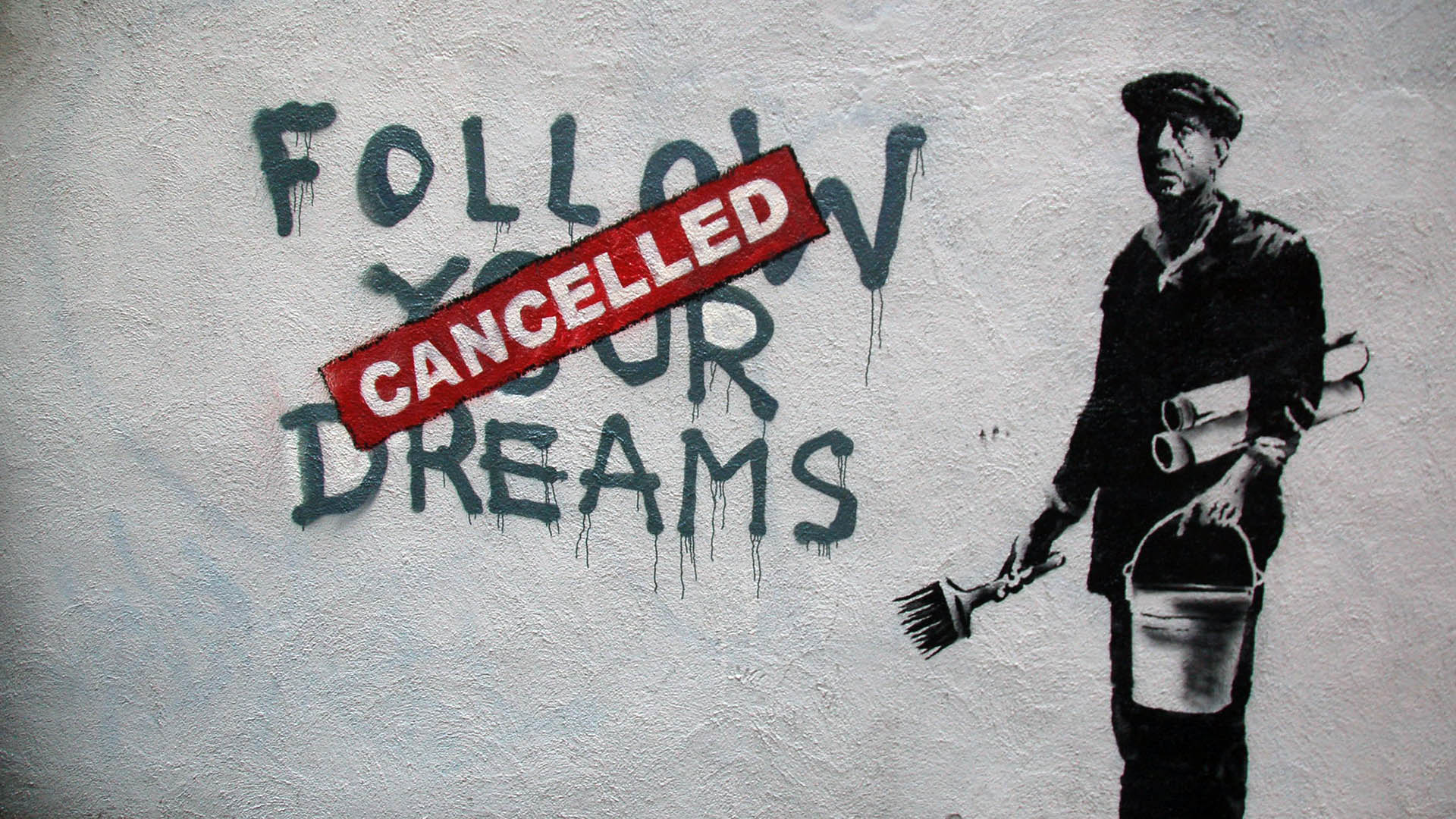Social media users can be forgiven for feeling dissatisfied. ‘Old media’ news, based on the perpetual celebrity comeback, has hit a conceptual impasse with new cancel culture. Geert Lovink calls for the renewal of social networking tools giving users a constructive voice.

Photo by Chris Devers from Flickr CC BY-NC-ND 2.0
The best way to keep a prisoner from escaping is to make sure he never knows he’s in prison.
Fyodor Dostoyevsky
Nobody and nothing seems safe. ‘Cremated’ eye shadow? Cancelled. The Dalai Lama? Cancelled. Israel? Cancelled. Novelty internet rappers? Cancelled, recancelled and then uncancelled. Kanye West? Cancelled for not cancelling.
The coronavirus pandemic is proving to be just the right temperature for the online breeding ground of US ‘cancel culture’. The spinning buzzword is a product of the merger between current social media platforms and the celebrity news industry, now considered ‘old media’. Mainstream outlets once survived off the continuous production of scandals, where VIPs, stars, royalty and media personalities were provoked to show off their bad behaviour in order to be condemned, only to reappear in the next cycle. In this system, scandals were neither exceptions nor signs of crisis but the very core of the business model. If bad characters would have previously been ‘cancelled’ (and, thus, made to disappear), soon there would have been nothing to report about.
Outrageous, dreamlike celebrities are, by definition, modelled not to act in a politically correct manner. In the old media model, the audience delegated or, should we say, outsourced their desires of excess to them. The extraordinary lifestyle defined and renegotiated ordinary, everyday norms. Until recently, celebrity role models (including intellectuals, writers and actors) performed in a fantasy world that both fascinated and disgusted ordinary folk, segmenting the very notion of class, of masters and slaves.
The question arises: is ‘de-platforming’ fundamentally changing the way entertainment and distraction are organized? Unless we change the parameters of our daily conversations and exit platforms together, yes.
Cancellation as divestment
In this social media age, ‘cancellation’ means unfollowing or unfriending certain individuals or organizations from your feed – ‘If you can’t beat ‘em, ban ‘em.’ It means terminating the communication once you’ve deemed their opinion, behaviour or a particular comment objectionable – a breakup in the name of social justice. Staying true to the transactional nature of the word, it can be considered a total divestment. Once reservations and credit cards were objects of cancellation. Now, it is ordinary people. Social media deletion logic has spilled over into the real with devastating consequences for activists and artists, causing a hysterical hype of witch hunt proportions in some circles.
Fear that ‘cancel culture’ may be here to stay has been demonstrated through its explanation of worthy goals such as the need for open debate and disagreement, which tolerance is supposed to endanger.1 In this accelerationist day and age, however, cancel culture paradoxically ignores and shortcuts the public sphere, and ushers out discussion.2 Users respond in split seconds and, before you know it, have moved on. Dopamine-driven, impulsive users are known for their ignorance of Habermas’ rules – they cannot be bothered with the long hours it takes for a general assembly to reach consensus.
Stuck on the platform
But the main fear of ‘cancel culture’ often remains unspoken. The US professional class is de facto locked-in and simply cannot think outside of the existing platform premises. Its members live haunted by ‘Will you still like me tomorrow?’ Losing followers on Twitter means the immediate loss of one’s reputation, attention and, ultimately, income. We’re all influencers now. Less likes and retweets literally mean a loss of salary. This is the high price intellectuals and artists pay once they have been sucked into the vortex and cannot see a way out. The Twitterati have zero imagination that a debate outside of social media channels is possible. In times of economic crisis, social media panic effectively leads to the closing down of the American mind: There Is No Alternative. We’re stuck on the platform.
Temporary expulsion of individuals from the tribe or nation has always happened. This is not unique. However, in the age of platform capitalism, millions of users are simultaneously presented with the same ‘outrageous’ moralistic content selected by algorithms, whose purpose it is to provoke as much interaction (clicks, retweets, comments, likes) as possible in order to keep us on the same service for as long as possible. In the age of social media, users are ‘paying’ (with) attention. A cancellation can reach a critical mass within hours. And this is the unpredictable part. Although users may wish to ‘delete’ evil characters in protest, this is simply not possible within the entertainment industry’s logic. America loves a comeback. And, in the digital age, your past can come back to haunt you anytime. At the moment it is uncertain which logic will win – social media or traditional publishing?

Photo via Pikist
The negative bail out
The ‘cancel culture’ meme can also be read as an amputated, passive-aggressive version of what is known in geek culture as ‘upvoting’ or ‘downvoting’, which originated in forums that existed before the World Wide Web. However, branding logic forbids the implementation of the downvoting principle, showing that platforms are not neutral. Users are not allowed to vote. They can only delete or ‘bail out’. Using the terminology of Heather Marsh, the user-as-reflector is able to ‘reflect’ current power relations.3 The technical premises of ‘cancel culture’ are unlikely to change soon – unless there is global demand for a fundamentally different network architecture.
We never hear of social media downvoting, as large marketing firms that organize the PR campaigns of brands, including politicians, pop stars and ‘influencers’, dominate current platforms. This global management class despises all things negative. They are not hired to organize, critique and debate. As we all know, ‘dislike’ buttons still do not exist. Today’s ‘cancel culture’ is therefore a pretty wild beast that seems to come from nowhere, provoking a lot of moral panic inside the ruling media elites, whose interest it is to keep the ‘bad characters’ on-stage. This is not supposed to happen. The atmosphere has to remain positive, at all costs. Celebrities may be sentenced, pay a fine and even go to jail, but they will reappear soon enough. After their remorse has been extensively covered, the cycle can start again. The spectacle goes on without addressing underlying problems such as sexism, racism, social inequality or climate change. ‘Issues’ stay under the surface until, surprise surprise, they burst out onto the streets, provoked by seemingly random events such as the murder of George Floyd.
In theory we could say that when we ‘cancel’, we unfollow and remove, or delete, data (in this case followers or ‘friends’). The collective act of deletion is perceived as surprisingly negative and destructive. It is seen as a symbolic way to say ‘No, thanks, I don’t like you anymore, get out of my life.’ Unfollowing someone quickly becomes a statement. Cancellation may be an implicit sign of user desires changing, a gesture that they want to abandon ship and call-off a symbolic connection to the figures that have been given power. But this viewpoint could be considered too voluntary. Instead, the hysteria group-think aspect of vanished mass psychology emphasizes that individuals ‘dissolve’ into one giant mass act of denunciation and get pleasure from the sudden movements of an invisible and usually non-existent online mob.
From a European materialist media theory perspective, cancellation is not an armchair replacement for ‘real’ protest but a software effect. Let’s leave the cultural analysis of ‘mass morality’ (Achille Mbembe), identity politics and the religious aspects of ‘woke’ culture to our American friends. Important emphasis should focus on the global implications of this culture embedded in code (both on the level of the visible interface design, and invisible algorithms and AI). If anything, ‘cancel culture’ is an expression of the limited ways we have to express ourselves on dominant social media.

Photo via Pxhere CC0 Public Domain
Scandal without consequences
There’s no doubt that certain norms associated with US-American ‘political correctness’ are prevalent within this context. However, we need to be careful. Decisive is the toxic clash at play here between two rival male cultures that fight over the dominance of a shrinking, regressive empire: the op-ed culture of liberal-conservative media versus algorithms written by geeks with their often white-supremist, right-wing, libertarian mindsets. Sudden waves of ‘public shaming’, initiated by influential mediators, aiming to humiliate individuals, are never spontaneous and only ‘go viral’ when they trigger values that already exist and are embedded. As Lisa Nakamura suggests, it may be better to transform the individual focus of cancellation into collective ‘cultural boycott’ campaigns, as it makes more explicit who’s acting and in what political context.4 Emotional terms such as ‘humiliation’ do not mean much. Record or film companies could decide to no longer work with an artist, consumers could stop buying their products or related merchandise, politicians could be voted out and, most importantly, investigative journalism could and should more often lead to actual prosecution and change of legislation. However, this rarely happens and leads to widespread resentment and rage. The endless production of scandals without consequences are the main reason behind the recent rise of organized public online shaming.
Just as social media users have no say about their next contract or new job, US ‘cancel culture’ in its current form is indeed a form of ‘protest without consequences’. We’re talking about clouds of sentiments that can blow over very quickly and even have reverse consequences. In times when multiple crises are being ‘stacked’ up, we should not be surprised that a strong anti-racism movement erupts alongside increasingly strict immigration laws and structural violence, particularly within education and the labour market. Discriminatory artificial intelligence and violence against women are both invisible. It is our duty as activists and researchers to make power visible. However, in spite of all the graphic and physical violence, which can theoretically be documented with cameras etc., we’re increasingly fighting against abstract violence (code, borders and other forms of structural separation).
Urgent change
Nevertheless, the Social Media Question is not an irresolvable problem.5 Jaron Lanier’s 2017 call to delete your social media accounts still holds.6 Europe’s big data and artificial intelligence billions need to be steered into the ‘Unlike Us’ direction of social media alternatives being built by multi-disciplinary teams, not just geeks (as is still the case with the EU Next Generation Internet programme). As the art world’s No.1 follower Hans Ulrich Obrist says, ‘It’s urgent!’7
Much as with COVID-19, finding a cure is imperative. Luckily, European alternatives to dominant social media platforms no longer based on advertising and hidden data extraction are entirely possible and can be built within months. From the perspective of change, many institutions that are beyond repair will have to be closed down – and Silicon Valley tops the list. New business models are in dire need. If you are hoping that a revolution will happen while remaining polite and not questioning anything or anyone in case somebody gets hurt, nothing will ever happen. In these times of acceleration, Corporate America has lost its monopoly on moving fast and breaking things. The immanent breakup and closure of Facebook will be a moment of liberation for mankind. By no means does it mean the end of the internet. Quite the opposite.
‘All mankind is divided into three classes: those that are immovable, those that are movable, and those that move’, Benjamin Franklin once said. It is sad to see that large corporations are now in the avant-garde position with their largely symbolic Facebook ‘Stop Hate for Profit’ advertising campaign. It is us, users, that are the immovable category. For decades Silicon Valley monopolized and stifled the innovation of communication and business. Users are trapped in ‘virtual cages’, clueless of how to escape. Virtually all activists, artists and geeks no longer have any imagination as to how an exodus could be organized (let’s not even talk here about academics, NGOs and the cultural sector).
Freeing Europe from the venture-capital start-up model, driven by hypergrowth and related ‘free’ services, could lead to a renaissance of social networking tools. The decentralized app landscape may seem chaotic at first but will inspire young people to become actors again, instead of tragic zombie consumers. Delete your profile altogether, not just some ‘friend’. It goes without saying that the development of alternatives should extend well beyond the strategic social media realm. We don’t need Airbnb or Uber to find a rental or call a taxi. New services can be based on data prevention rather than protection. Give ‘peer-to-peer’ a chance. Let’s find other ways that we can search for information and each other. Yes, this also implies that we cancel Google (not just Facebook) and reclaim their algorithms and databases, as it was us, the people, who provided them with that data in the first place.
‘The way to defeat bad ideas is by exposure, argument, and persuasion, not by trying to silence or wish them away. We refuse any false choice between justice and freedom, which cannot exist without each other. As writers we need a culture that leaves us room for experimentation, risk taking, and even mistakes. We need to preserve the possibility of good-faith disagreement without dire professional consequences.’ https://harpers.org/a-letter-on-justice-and-open-debate/.
H. Marsh, The Creation of Me, Them and Us, MustRead Inc., 2020, p. 108.
Quote J. E. Bromwitch, 'Everyone is Canceled', https://www.nytimes.com/2018/06/28/style/is-it-canceled.html.
Cf. irresolvability chapter discussing works of Christa Wolf: M. Fuller and O. Goriunova, Bleak Joys, University of Minesota Press, 2019.
J. Lanier, Ten Arguments for Deleting Your Social Media Accounts Right Now, London, Vintage, 2018.
Title of Obrist’s Arles exhibition, summer 2020, https://www.enrevenantdelexpo.com/2020/06/15/its-urgent-au-parc-des-ateliers-luma-arles/.
Published 4 August 2020
Original in English
First published by Eurozine
© Geert Lovink / Institute of Media Cultures / Eurozine
PDF/PRINTIn collaboration with
Newsletter
Subscribe to know what’s worth thinking about.
Related Articles

Since the collapse of Novi Sad’s train station in November, student-led protests have erupted across Serbia, inspiring a nationwide movement against corruption.

Since the mass protests in Belarus in 2020, the Lukashenka regime has undergone a totalitarian transformation. Its many instruments of repression serve a single end: to prevent civil society from becoming the driving force of another revolution.









